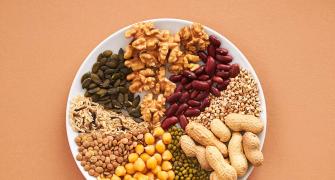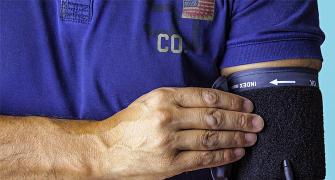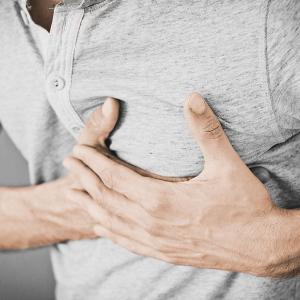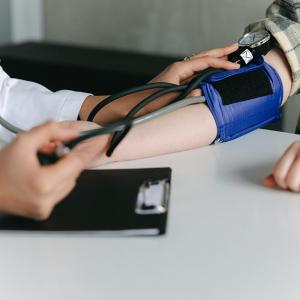Sodium is the most important parameter that people with hypertension should monitor, says Riddhi Jadhwani, health coach and founder of PositivEats.
Increase your intake of potassium through your diet and avoid the use of excessive salt in your food.

Do you find yourself caught up experiencing increased heartbeat, pounding headache and difficulty in breathing?
These are considered to be the typical symptoms of hypertension or high blood pressure -- a condition where a person's blood pressure levels cross the healthy level.
Through careful consideration of one's nutritional needs and lifestyle alterations, hypertension can be effectively regulated.
Medication and nutrition work hand in glove, and therefore it is vital to regularly discuss your health needs with a nutritionist to fight hypertension and avoid fatty foods.
These are some healthy changes in your diet to reduce the risk of hypertension:
1. Start your morning peacefully
Our bodies experience fluctuations of vital parameters throughout the day.
In the morning, the blood pressure is believed to be high, which is why one should avoid suddenly getting out of bed.
As a practice, a few minutes after you wake up, have a few deep breaths before standing up.
You must try to wake up on time so that you have a few minutes to spare before getting on with the day.
2. Limit your salt intake
Sodium is the most important parameter that people with hypertension should monitor.
Consuming excessive amounts of salt leads to an increase in sodium levels which further aggravates regular blood pressure to abnormal levels.
Increase your intake of potassium through your diet and avoid the use of excessive salt in your food.
You may even consider the following:
- Switch to low-sodium salt.
- Rinse off canned food to wash off extra salt
- Cook at home, so that you can control the amount of salt, sugar and fat in food
- Read the label on packaged lunch meats to assess the sodium information
- Consult your nutritionist to gain awareness on your required salt intake
- Switch to pink salt
- Try seasoning your food with flavourful, salt-free herbs and spices
Your food might taste bland when you first put down the salt shaker, but your palate will adapt quickly.
But please remember to consult your nutritionist about your required sodium, as low sodium diet is equally unhealthy.
3. Refrain from caffeine
Too many cups of coffee or tea, and even energy drinks should be avoided.
Caffeine from any source causes the blood vessels to constrict, which raises the blood pressure.
High blood pressure due to caffeine also results in severe headaches and increased heart rate. Instead, you may switch to decaffeinated coffee and further discuss your habits with your nutritionist.
4. Stock these up
While there seems to be numerous foods and habits to avoid, you can certainly incorporate these nutrient rich foods in your regular diet:
- Fruits, such as bananas, red beets, pomegranate and strawberries
- Green vegetables including spinach, cabbage, broccoli and mustard greens
- Raw nuts and seeds, but ensure that they are unsalted
- Skim milk or yogurt is low in sugar and fat
- Dark chocolate
5. Go easy with the pressure
Whenever we push or exert pressure through the body, the body focuses on supporting the activity and the blood pressure tends to increase steadily.
The morning ritual of defecation is also linked with blood pressure. You might wonder how?
Well, to put it simply, the morning time is an active time for the large intestine meridian so as to facilitate bowel movements.
Those who experience constipation regularly, feel the need to exert more force while defecating. It is unhealthy to force such a movement, as the blood pressure will soar high.
This abdominal pressure can lead to the risk of cardiovascular and cerebrovascular diseases.
As a healthier option, one must include natural laxatives in the diet.
6. Heart health
If your blood pressure remains high over a sustained period of time, your doctor might prescribe medication to lower it.
If not paid attention to, hypertension can damage your arteries and lead to serious complications like heart attack. Even if you are regular with medication, you must work on lifestyle changes.
7. Limit smoking and liqour
Consider your choices wisely!
Too many alcoholic drinks can make your blood pressure soar high.
People who drink alcohol regularly should try and limit themselves to two drinks a week.
If you use tobacco, or regularly smoke cigarettes, you should reconsider your habits.
Get help to quit if you need to before it is too late.
8. Reduce stress
Take steps to reduce the stress in your life.
Try to limit the number of personal commitments you make.
Avoid your personal stress triggers as much as possible. Take effort to manage your anger
9. Sweat it out
A sedentary lifestyle can raise your heart rate, which taxes your heart and raises your blood pressure.
Staying physically active can help lower your blood pressure. All you need is 30 minutes of moderate physical activity on most days of the week.
Sweating releases sodium through perspiration, which can be beneficial in managing BP.
10. Still, slow down
Including exercise in your daily health regimen is great. That being said, one must only focus on exercises that are suitable as per one’s age, body weight, and health condition.
For people with hypertension, doing the wrong exercise can be risky. It is not recommended to indulge in heavy exercise on an empty stomach.
While exercises should be slightly challenging in terms of feeling the stretch in the body, one must not exceed the capacity.
Comfortable and consistent exercise is way more healthy than inconsistent heavy exercise.
If you exert and exceed your body's capacity, your body will increase the oxygen supply to the heart and put pressure on blood vessels.
While this is bound to worsen hypertension, it may even lead to a stroke or embolism, among other risks. Be wise and go easy on the exercise regimen.
Additionally, you must invest in a home blood pressure monitoring device to track your daily blood pressure over time.
You'll be able to see the effects of exercise and diet on your blood pressure, which is a positive feedback loop!
Be aware of your blood pressure and work to keep it under control, by keeping your nutrition and medication in check.
Furthermore, you should not be insecure and anxious about your health problems. Instead, be aware, watch your diet, resist eating junk food, think before you stress over an issue and ultimately, stay calm.










